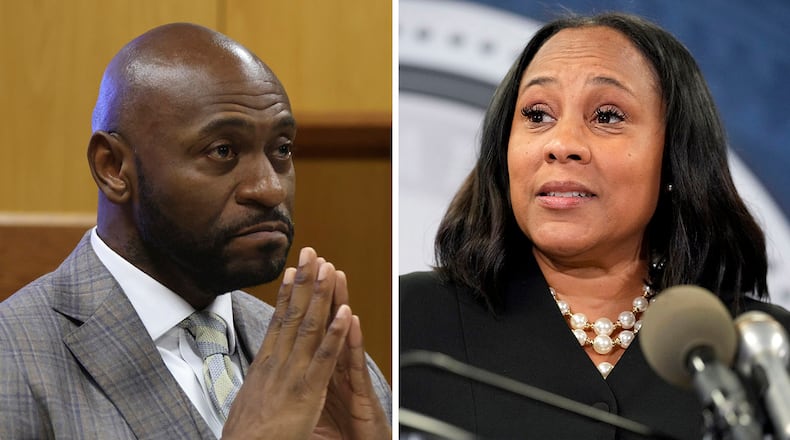Fulton County prosecutors on Monday urged the state Court of Appeals not to consider a judge’s ruling allowing District Attorney Fani Willis to continue prosecuting former President Donald Trump and others in the ongoing election interference case.
Trump and eight co-defendants, who tried to have Willis disqualified from the case, have asked the higher court to hear their appeal of Superior Court Judge Scott McAfee’s decision before trial.
But the DA’s office said in a court filing on Monday that McAfee had properly applied well-established law to the facts. And because the defendants “have wholly failed to carry their burden of persuasion,” the appeals court should send the case back to McAfee and let it proceed to trial, they said.
The response is the latest salvo in a battle that began in January when Trump co-defendant Michael Roman sought to disqualify Willis and her office. Defense attorneys argued that Willis’ romantic relationship with former special prosecutor Nathan Wade gave her a financial stake in the prosecution. They said Willis paid Wade’s firm hundreds of thousands of dollars, then benefited when Wade paid thousands of dollars for vacations the couple took to Aruba, Napa Valley and other locales.
The defense also said Willis’ comments on the weekend of the Rev. Martin Luther King’s birthday at a Black church — where she suggested the accusations of impropriety were racially motivated — amounted to “forensic misconduct” and should be disqualifying.
Willis and Wade argued they did nothing improper. In court filings and testimony, they said their romance began months after Willis hired Wade and ended last summer. And they said they split the cost of their travel roughly evenly, with Willis paying her share mostly in cash and receiving no financial benefit from the case.
In his ruling last month, McAfee found the defendants had not proved Willis’ relationship with Wade posed an actual conflict of interest. But he said an appearance of impropriety could continue to haunt the case. So, he gave Willis an ultimatum: Either drop Wade from the prosecution or see herself and her entire staff disqualified. Wade resigned that same day.
“Setting aside whether Wade’s removal from the case was in fact necessary, he withdrew from representation hours after the trial court issued its order and the district attorney accepted the resignation,” the DA’s office told the appeals court. “Accordingly, the trial court properly exercised its discretion and inherent authority in denying the motion to disqualify based on an appearance of impropriety.”
For this reason, there is no basis for the appeals court to hear the appeal, the DA’s office’s filing said.
McAfee did not find Willis’ church comments to be disqualifying. But he found them to be improper and suggested he would consider imposing a gag order prohibiting the DA from further discussing the case in public. (No request for such an order has been filed.)
The DA’s office reminded the appeals court that McAfee concluded that the church speech did not “cross the line.” That is because he found that Willis did not name any of the defendants, did not disclose confidential information and did not address the merits of the case. Also, the case is “too far removed from jury selection for any actual prejudice or improper effect on the jury pool to actualize,” the DA’s office said.
After receiving permission from McAfee, the defendants appealed the judge’s decision to the Georgia Court of Appeals. They argued the judge had erred in failing to disqualify Willis — an error that should be corrected before the case goes to trial. They also appealed McAfee’s decision not to dismiss the case entirely.
In their filing to the appeals court, the lawyers for Trump and his eight co-defendants alleged Willis and Wade gave false testimony. They allege their romantic relationship began before Wade was appointed special prosecutor. But the DA’s office noted that, for purposes of this appeal, McAfee is the finder of fact, and he made no such findings to support such a claim.
The Court of Appeals has until mid-May to decide whether to accept the case. If it does, a decision could take months. In the meantime, McAfee has said he will continue to move the case forward.
Separately on Monday, lawyers for Trump and a number of co-defendants asked McAfee to allow them to appeal his recent decision not to dismiss charges on First Amendment grounds. At a recent hearing, Trump’s lead attorney, Steve Sadow, argued that the defendants cannot be criminally charged for political speech that is protected by the First Amendment. It is now up to McAfee to decide whether the defense can once again ask the higher court to hear a pretrial appeal.
“The motion powerfully expresses that the indictment wrongfully criminalizes core political speech and expressive conduct protected by the First Amendment,” Sadow said in a statement released Monday. “There is no democracy without robust and uninhibited freedom of expression.”
.
Keep Reading
The Latest
Featured





